More than a quarter of veterans in Boston over 80


More than a quarter of military veterans living in Boston are over 80 years old, census data shows.
The 2021 census was the first to ask people about whether they had previously served in the armed forces.
Advertisement
Hide AdAdvertisement
Hide AdFigures from the Office for National Statistics show there were 2,777 veterans living in Boston in March 2021 – around 820 (29.5%) of whom were over the age of 80.
The census shows 3.8% of people in England and Wales aged 16 and over had served in the armed forces, or 1.9 million people.
At the time of the census, 31.8% of veterans were aged 80 or over – compared to just 5.1% of the non-veteran population.
The high proportion of octogenarian veterans is a product of the War Service and National Service that ran in the UK between 1939 and 1960, the ONS said.
Advertisement
Hide AdAdvertisement
Hide AdNational Service was a system of conscription that required healthy males aged 17 to 21 to serve in the armed forces for between 18 months and two years.
It was phased out in the late 1950s, meaning the last surviving people to have taken part in National Service will now be well into their 80s.
There were around 160 veterans over 90 years old in Boston as of March 2021.
Meanwhile, just 5% of veterans in the area were younger than 35.
Advertisement
Hide AdAdvertisement
Hide AdRich Pereira, head of demography at the ONS, said: “Today’s data gives a greater understanding of our veteran armed forces community."
He added that the figures would be "crucial" for support and services for veterans.
While most veterans in England and Wales were born in the UK (94%), around one in six (17%) said they did not currently hold a passpo